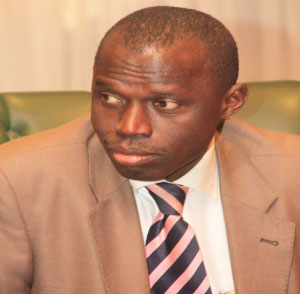
The project is the third phase funded by the African Development Bank (ADB) mainly to finance the institutional support for economic and financial governance.
The main objective of the project is to promote inclusive growth and macroeconomic stability by enhancing financial governance through improved domestic resources mobilisation and a more effective financial management system.
The project is divided into three components: component 1 - enhancing domestic resources mobilization; component 2 - strengthening effectiveness in public financial macroeconomic, and component 3 - project management.
In his launching statement, Lamin Camara, deputy permanent secretary at the Ministry of Finance dwelt on the efforts of the African Development Bank in providing institutional support projects to The Gambia.
He said that under the first and second phases of the institutional support projects they had witnessed success in building capacity in fiscal and macroeconomic management, accounting, auditing and public scrutiny.
For the previous phases, with the complementary interventions of other partners, the government had realised achievements in its public financial management reforms agenda.
He added that significant successes have also been registered in increased performance in customs and domestic tax revenue collections, reduction of the backlogs of government un-audited accounts from about ten years to barely a year or two and the introduction of performance audits by the National Audit Office, as well as re-establishment of the function of the internal audit within government.
Notwithstanding these achievements, he noted, there is need for the consolidation of the gains through additional support, hence the new project.
According to DPS Camara, the ADB had provided UA2 million (equivalent to US$3million) to finance the institutional support for economic and financial governance.
The project would help strengthen public financial management in improved domestic revenue mobilisation to help in reducing the problem of fiscal imbalance, capacity building in public procurement, macro-fiscal management, budgeting, accounting, auditing, aid coordination and debt management, he stated.
It would also help in capacity strengthening of the finance and public accounts committee of the National Assembly for enhanced external scrutiny and enhanced capacity of the Gambia Institute of Chartered Accountants, he said.
He said the beneficiaries of the project are the Ministry of Finance and Economic Affairs and its satellite institutions such as the Gambia Revenue Authority, Gambia Public Procurement Authority, Women’s Bureau, Gambia Institute of Chartered Accountants, and National Audit and Public Accounts Committee of the National Assembly.
The key expected outcome of the project are improvement in domestic revenue mobilisation through the upgrading of the customs automated system, and enhancement of the quality and timeliness of report for public accounting and auditing institutions to meet international standards, increase accountability and more efficient use of public resources for poverty reduction.
On behalf of the Gambia government and the Ministry of Finance and Economic Affairs, Mr Camara expressed appreciation to the ADB for its support to the government’s public financial management efforts.
He implored on the project staff, beneficiaries and the bank to be dedicated and responsive to the project implementation needs.
The project would be managed and monitored by the Ministry of Finance and Economic Affairs, he said.


